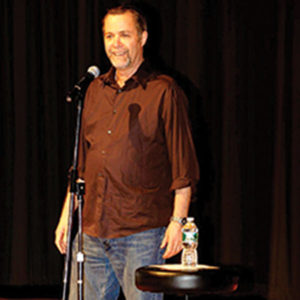By Ed Karvoski Jr., Culture Editor

Photo/Trebmal Photography
Medford – Jack Lynch of Medford integrates his work experiences as a stand-up comedian and a licensed addiction specialist with a firsthand understanding gained from his own recovery from alcohol and drugs.
As founder of Comics for Recovery, he produces and emcees shows featuring lineups of his comic colleagues to benefit addiction recovery organizations.
“I’m doing comedy now more for the fundraising and to have fun,” he noted. “It’s a really good outlet. When you go up onstage and something works, there’s a creative buzz that goes with it.”
In the 1980s, Lynch frequented the now-closed Cambridge comedy clubs Catch a Rising Star and Ding Ho. There, he developed an interest in stand-up comedy, but not the nerve to face an audience yet.
“I always tried to get the courage up to do it, but I’d get so drunk,” he recalled. “I was in the throes of addiction.”
Lynch recognized similarities between himself and a friend. The realization led him to Alcoholics Anonymous meetings and ultimately a detox center in 1984.
“One of my closest friends took his own life and the first thing I said was, ‘Where’s the whiskey?’” Lynch recounted. “I realized that booze was my only coping skill. I cried and mourned my friend, and realized that I was in the same loop he was in with drinking and substance use. It scared the hell out of me.”
In recovery, Lynch returned to Catch a Rising Star in 1991 to perform his first open mic. He persevered through his nerve-racking stage debut.
“I was a ball of anxiety,” he acknowledged. “The first line out of my mouth was, ‘I’m a little nervous. Does anybody have any Valium?’ It got a laugh. I calmed down a little bit, but sped through the jokes. I thought even if I never do this again, I’m glad that I walked through the fear – stone-cold sober, too.”
Soon afterward, Lynch began performing regularly at Boston-area clubs and East Coast colleges. He proceeded to tour nationally and in Canada while working in environments that he considers “enabling.”

Photo/Nicole Veneto
“You work in nightclubs where there’s booze and drugs – and drinks are usually free,” he said. “It’s one of the few jobs where it’s acceptable to have a beer while you’re working. Even working in theaters, there’s a party atmosphere backstage. I was fine most of the time. There are actually a lot of comics in recovery.”
His recovery became funny fodder.
“When I first went to AA, they pumped me so full of coffee that I’d have a couple drinks to calm down,” he joked.
While Lynch enjoyed his on-the-road job for many years, he eventually decided to seek a different line of work closer to his home. He reached that conclusion after achieving enthusiastic responses from his audience in West Palm Beach.
“It’s the weirdest thing; you just made 300 people laugh, and an hour later you’re in a hotel room by yourself with a pizza,” he relayed.
Lynch got his first job working with people in recovery at a dual-diagnosis program in 2007. He completed an addiction program at Middlesex Community College in 2009, and became a licensed drug and alcohol counselor in 2012.
Along the way, Lynch founded Comics for Recovery. Now, he appreciates complementing his counseling work with producing and emceeing fundraisers.
“I feel a bigger sense of purpose doing these shows,” he explained. “People come up afterward and say, ‘This is the first time I’ve laughed so much in recovery.’ And there’s so much ‘inside’ material at these shows.”
Many of these audience members relate when Lynch comically compares current lingo with the era of his stage debut.

Photo/Nicole Veneto
“We had terms back then that mean something totally different now,” he tells them. “In 1991, ‘Instagram’ meant your coke dealer lived next door.”
Among several benefitting causes is Massachusetts Organization for Addiction Recovery (MOAR). Since 2010, Lynch has produced each of the annual “MOAR Laughs” benefits and entertained its audiences including halfway house residents.
“This fundraiser is even more than raising money and awareness for MOAR,” Lynch noted. “It’s also helping people in recovery forget about their troubles for a couple hours. This is way more rewarding for me than playing nightclubs.”












